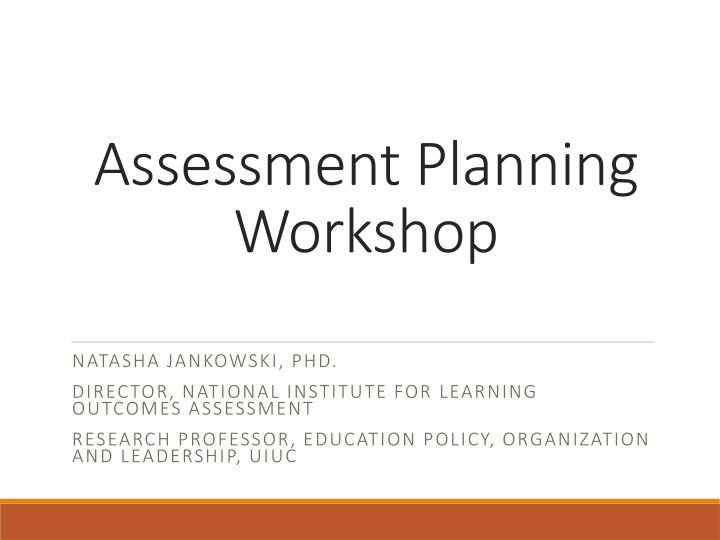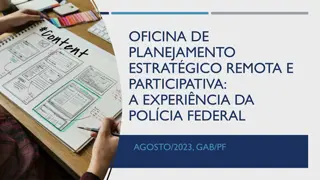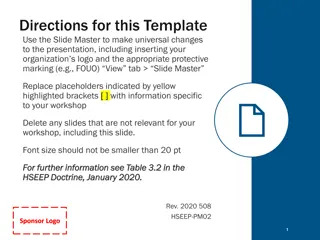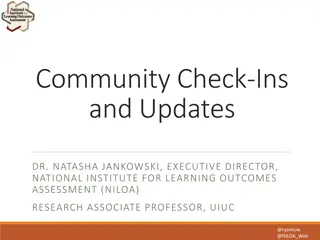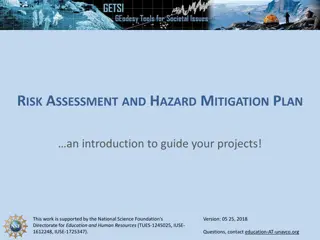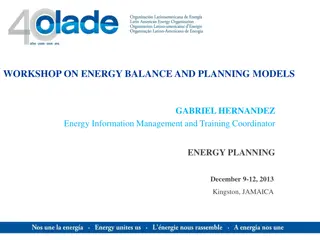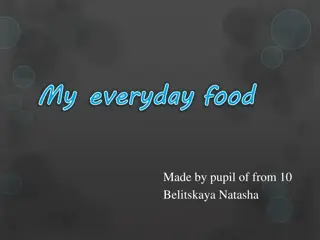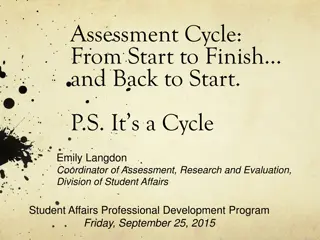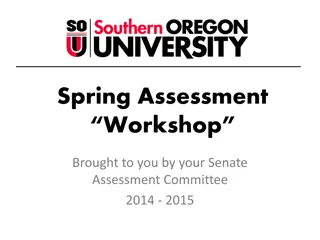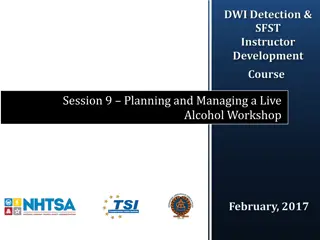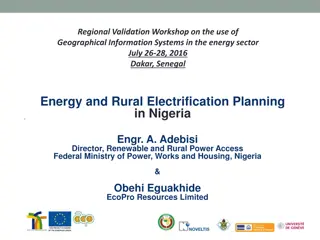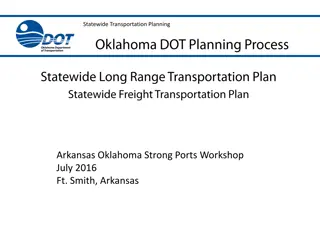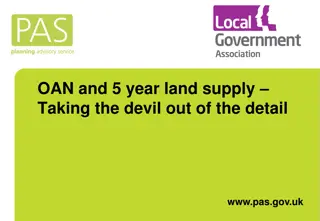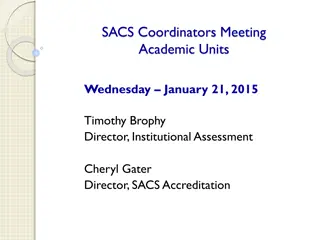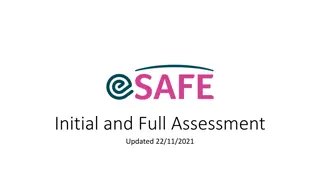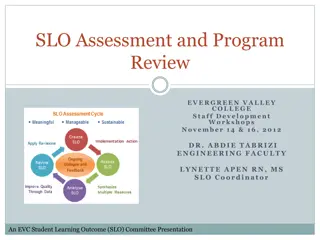Workshop on Assessment Planning by Dr. Natasha Jankowski
Dr. Natasha Jankowski, Director of the National Institute for Learning Outcomes Assessment, conducts a workshop focusing on effective use of assessment data to enhance undergraduate education. The workshop covers areas like evaluating assessment plans, program learning outcomes, and assessment rubric analysis. Participants engage in group activities and individual work to improve assessment practices and student learning outcomes.
Download Presentation

Please find below an Image/Link to download the presentation.
The content on the website is provided AS IS for your information and personal use only. It may not be sold, licensed, or shared on other websites without obtaining consent from the author.If you encounter any issues during the download, it is possible that the publisher has removed the file from their server.
You are allowed to download the files provided on this website for personal or commercial use, subject to the condition that they are used lawfully. All files are the property of their respective owners.
The content on the website is provided AS IS for your information and personal use only. It may not be sold, licensed, or shared on other websites without obtaining consent from the author.
E N D
Presentation Transcript
Assessment Planning Workshop NATASHA JANKOWSKI, PHD. DIRECTOR, NATIONAL INSTITUTE FOR LEARNING OUTCOMES ASSESSMENT RESEARCH PROFESSOR, EDUCATION POLICY, ORGANIZATION AND LEADERSHIP, UIUC
National Institute for Learning Outcomes Assessment NILOA NILOA s mission is to discover and disseminate effective use of assessment data to strengthen undergraduate education and support institutions in their assessment efforts. SURVEYS WEB SCANS CASE STUDIES FOCUS GROUPS OCCASIONAL PAPERS WEBSITE RESOURCES NEWSLETTER PRESENTATIONS TRANSPARENCY FRAMEWORK FEATURED WEBSITES ACCREDITATION RESOURCES ASSESSMENT EVENT CALENDAR ASSESSMENT NEWS MEASURING QUALITY INVENTORY POLICY ANALYSIS ENVIRONMENTAL SCAN DEGREE QUALIFICATIONS PROFILE TUNING www.learningoutcomesassessment.org
Our Time Together Sit with 3-4 other programs you don t know We will cover 4 different areas in 30 minute time blocks You will be working individually as well as in your group Proceed with confidence!!
Program _____________________________________________________ Date____________________________ Checklist for Evaluating Assessment Plans Meets Standard Recommendations Aligned with and specific to the program s mission Clearly measurable Outcomes Expressed in language that focuses on what students will be able to demonstrate Content to be assessed fits outcomes and Data collection process is briefly described Methods/ Measures Both direct and indirect measures are used Findings entered for each measure Status of finding indicated and clearly described Results/Findings Appropriate evidence is presented Action plan is developed from findings and aligned with outcomes Actions (use of results) Clearly describes intended improvements Program shows use of assessment results for improvement Report is complete (all questions answered) and up to date Reporting A detailed assessment plan is included.
Boston University Program Learning Outcomes Assessment Rubric for Evaluating Assessment Plans Program _____________________________________________________ Missing Does Not Meet Standard Mission Statement does not clearly describe the program s purpose Date____________________________ Meets Standard Clearly states broad aspects of the program s function Aligned with University Mission Exceeds Standard Includes purpose, primary functions, activities, and stakeholders Differentiates from missions of other units or divisions Expands on the university mission Includes initiatives that resulted from previous assessments Is responsive to new information or changing environment Recommendations Outcomes Not aligned with mission or Not measurable; Outcomes are bundled or expressed in statements that include multiple outcomes Aligned with and specific to the program s mission Clearly measurable and Expressed in language that focuses on what students will be able to demonstrate Content to be assessed fits outcomes and Data collection process is briefly described Both direct and indirect measures are used Findings entered for each measure Status of finding indicated and clearly described Appropriate evidence is presented Action plan is developed from findings and aligned with outcomes Clearly describes intended improvements Program shows use of assessment results for improvement Report is complete (all questions answered) and up to date Methods/ Measures Do not match outcomes or Does not describe data collection process Designed to promote improvement Clearly articulated rationale described Designed to identify areas for improvement plan presents multiple assessment methodologies Multiple periods of data are available Trends or patterns over time are discussed Dissemination of results to appropriate stakeholders has been completed Findings Not aligned with measures Description/results missing Actions (use of results) Not aligned with outcomes Does not describe intended improvements Responsibilities for actions are assigned Target implementation date for action is stated Implemented and planned changes are described and linked to assessment data (if no changes are reported, an explanation is provided) Plan is clearly presented in the annual report and describes a full assessment cycle for all outcomes. Additional documentation describes methods, findings, and actions taken in more complete detail. Report shows continuity with previously submitted reports Annual report is not complete or not up to date Reporting
Program Assessment Plan Template (one per program) Program ________________________________ Contact Name and Email Address ___________________________ Please use the template below to devise a schedule for assessing program learning outcomes over time. Your schedule should demonstrate that the program is using both direct and indirect measures, and that all learning outcomes will be assessed. Date______________________ . Learning Outcomes Methods of Assessment (direct or Indirect) Evidence needed (indicate who will collect, and when) How will evidence be assessed (using a rubric, summary of survey results, etc.)? rubric Who will assess the evidence? (give dates) How and with whom will results be shared and discussed? (give dates) How will decisions about future actions be made, and by whom? (give dates) When will action be taken? Who is responsible for assuring that the action is taken? Example: Oral Communication student presentations public presentations of capstone work at student symposium on 5/5/16 jury of faculty (5/5/16) discussion of reported results at full faculty meeting 9/16 Faculty will recommend changes to the department curriculum committee by the end of fall semester Spring 2017 Director of UG Studies 1. 2. 3. 4. 5. 6. 7.
At your tables as a group Take turns explaining your plan (or what you would like to do for an assessment plan if you don t have one) to the others members of your table You have 7 minutes per program to share
Report out What did you learn?
Part Two: Ideal Graduate Individually draw a picture of your ideal graduate Give them a name Write out their characteristics what do they do, what do they know, what sort of a person are they? You have 5 minutes
As a Table Now share your ideal graduate with the other members of your table- tell them about your graduates hopes and dreams! You have 7 minutes total to share
Nowlook at your assessment plan Individually, look at your learning outcome statements on your assessment plan are there any that align with your ideal graduate? Pick one learning outcome that you would like to revise that maybe isn t quite capturing the person you described
Learning Outcomes Learning outcomes identify what students will know and be able to do by the end of a course or program. They should be framed as statements that describe significant and essential learning that students can demonstrate and should represent your highest aspirations for your students. Even learning outcomes that seem ineffable or difficult to quantify can usually be assessed by some measure and should be included in program learning outcomes. (Stanford resource on writing learning outcomes on the BU website)
Learning Outcomes Learning outcomes should be framed in terms of the program instead of specific classes that the program offers. It s a team sport we all have to work together to help the student achieve it it s not something they will acquire in an individual course. Learning outcomes should focus on learning products and not the learning process. Learning outcomes are based in concrete action verbs
With the help of your group Revise your selected learning outcome You have 7 minutes
Report out What did you learn?
On your own What type of evidence would you need to know the learning outcome has been met? You have 3 minutes Take a look at your plan are there assessments that align with the learning outcome and provide you with the evidence you need? Revise your assessment plan as needed You have 5 minutes
Mismatch? Alignment and fitness of method occur in relation to the verbs identified in the learning outcome statement In your own assignment what are you asking students to actually do or demonstrate?
Share with the group Discuss as a group how your assessments align or potentially have a mismatch with your revised learning outcome You have 7 minutes
Report out What did you learn?
Choose your own adventure Do we need to talk about mapping and/or assignment design?
Last part!!! You are doing great!!!
Individually Let s say you implement this plan and you now have data on your ideal graduate s progression when and where will you talk about what you find and what to do with the data? What are your processes for making sense of the evidence and having discussions AS A PROGRAM about what it means? Will you involve students? Others? You have 3 minutes
As a table Share you plans for continued engagement with assessment as an ongoing part of your professional practice as a program with your table members You have 7 minutes
Now Time to get up and stretch find someone that you have not talked with yet today, walk over and introduce yourself, and explain your revised assessment plan to them.
Questions Email: niloa@education.illinois.edu njankow2@Illinois.edu http://www.learningoutcomesassessment.org www.assignmentlibrary.org www.degreeprofile.org
